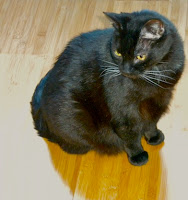Lilith and Pookie were my first two cats. They were littermates. They came to live with me when they were only five weeks old. Alas, Pookie passed onto her next life over a decade ago (inoperable tumor), but Lilith will turn 18 years old next month (and she doesn’t look a day over 13).
They were close even as they grew out of kittenhood into adolesence and adulthood into middle age. Whatever her age, though, Pookie never outgrew her love of chasing tail. Mostly it was her own tail (her preferred perch was my bicycle seat. which still bears her clawmarks), but sometimes Lilith’s was the target. Pookie would be mezmerized by the sight of Lilith’s tail swinging over the edge of the couch and begin her stalking routine. She would crouch and wiggle her rear end ever so slightly. Then she would pounce. But the tail would be gone.
 |
| Lilith the Clever |
Lilith the clever had deliberately positioned herself on the couch edge. Then she would slowly swish her tail in clear sight of Pookie, drawing her attention. Lilith would pretend not to notice Pookie, but her timing gave her away. As Pookie pounced, Lilith snapped her tail up and out of reach. Without fail.
Lilith and Pookie were two cats at play. The ramifications of Pookie being lured into chasing Lilith’s tail were, well, non-existent. But for us people, it is a very different tail, er, tale.
People who mean you harm will often use desirable lures to distract you from their real intent. Some can be quite clever at discerning an unfulfilled need, and holding out an offer. The idea is to physically isolate you after they’ve gained a small measure of your trust. When you are alone with the perp, they will make their move quickly, and you will be surprised and in denial. In many instances the assault will be over before you realize you’ve been assaulted. In fact, you may never even name your experience as assault.
The lesson of this tale is something you’ve heard again and again. If it’s too good to be true, if it’s too perfect, listen to your gut’s reservations. Because, unlike Pookie and Lilith’s tail, your consequences may last longer than 5 seconds.
